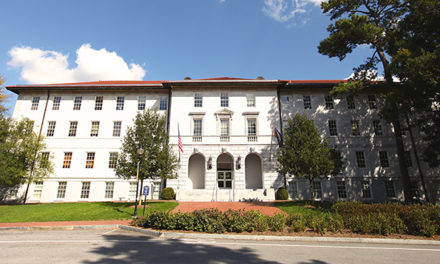In response to numerous complaints about the smell coming from the toilets in the Hamilton Holmes Residence Hall, Vice President for Campus Services Matthew Early announced his creation of an action plan to resolve the issue at a meeting Monday evening.
Only the smell of the water in the toilets, not the water’s cleanliness, is currently being affected, according to Early. The plan could cause 15 to 20 Longstreet-Means residents to lose access to water for eight to 10 hours later next week.
As of Monday, Hamilton Holmes stopped using the gray water system and is temporarily using the domestic water system until pipes from Longstreet-Means are redirected.
Hamilton Holmes and Longstreet-Means are the only two residence halls on campus that use a gray water system in which water from the shower, sink and laundry room of Longstreet-Means pass through a tank and filter. The water is then treated with chlorine and ultraviolet (UV) rays, and the reclaimed water is then used in the toilets of Hamilton Holmes and Longstreet-Means.
Mechanics believe the lingering smell is the result of laundry detergent blocking the UV rays and filters used to treat the water, which results in not allowing the odor to dissipate, Early said. Once these issues were discovered two weeks ago, the tanks went from being cleaned once a week to every day, but the smell remained.
Early said the problem was been impossible to anticipate before residents moved into the resident halls.
The first step to help fix the smell is to redirect the water from the largest laundry room in Longstreet-Means, Early said at the meeting.
This step would, in turn, decrease the amount of detergent flowing though the main sewage system and thus address the situation.
If the smell still persists, Campus Services will transfer the depositation of an entire wing of Longstreet-Means water from the gray water system to the regular sewage system, Early explained. And if none of these options satisfy residents, Hamilton Holmes will permanently switch to a domestic water system.
“At the end of the day, it’s about making the residents happy,” Early said during the meeting.
Most other facilities around campus use the domestic system, which includes clean water that comes from a DeKalb County facility.
According to Early, the gray water system is better for the environment and helps combat Atlanta’s drought situation, which is why the University would prefer to find a solution as opposed to switching the domestic water system. However, he said, he is not opposed to switching permanently to the domestic water system if residents remain displeased with the odor.
“We could permanently switch to domestic water right now, but we would prefer to do everything we can to reduce our demand on the environment,” Early said.
Hamilton Holmes has temporarily been placed on the domestic water system until the laundry room pipes from Longstreet are redirected.
When maintenance placed Hamilton Holmes on domestic water, they accidentally put Longstreet on the system as well because the two residence halls’ systems are connected.
Water pipes at Hamilton Holmes had to be manually shut off, and Longstreet-Means is now back on the gray water system.
The sink and shower water of Longstreet and Hamilton Holmes are in no way connected to the gray water system and have always used domestic water.
– By Melissa Fenchel
The Emory Wheel was founded in 1919 and is currently the only independent, student-run newspaper of Emory University. The Wheel publishes weekly on Wednesdays during the academic year, except during University holidays and scheduled publication intermissions.
The Wheel is financially and editorially independent from the University. All of its content is generated by the Wheel’s more than 100 student staff members and contributing writers, and its printing costs are covered by profits from self-generated advertising sales.





